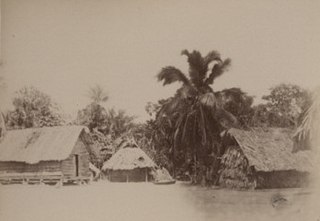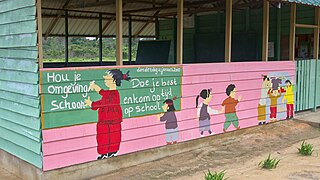
The economy of Suriname was largely dependent upon the exports of aluminium oxide and small amounts of aluminium produced from bauxite mined in the country. However, after the departure of Alcoa, the economy depended on the exports of crude oil and gold. Suriname was ranked the 124th safest investment destination in the world in the March 2011 Euromoney Country Risk rankings.

Para is a district of northern Suriname. Para's capital city is Onverwacht, with other towns including Paranam, and Zanderij. Para has a population of 24,700 and an area of 5,393 km2. The district is the mining and forestry centre of Suriname, with many large bauxite mining operations operating. The district is a mixture of forest and savannas.

Sipaliwini is the largest district of Suriname, located in the south. Sipaliwini is the only district that does not have a regional capital, as it is directly administered by the national government in Paramaribo.

Wanica is a district of Suriname located in the north of the country. Wanica's capital city is Lelydorp, the second-largest city in Suriname. Wanica has a population of 118,222 and an area of 443 km2. Following neighbouring Paramaribo, Wanica is the second most populated and urbanised district of Suriname. Two-thirds of the country's population live in these two districts.

The Paramaccan or Paramaka are a Maroon tribe living in the forested interior of Suriname, mainly in the Pamacca resort, and the western border area of French Guiana. The Paramaccan signed a peace treaty in 1872 granting the tribe autonomy.

Kwakoegron is a town and resort in Suriname. It is located inland, due south of Paramaribo. According to the 2012 census it has a population of 263, and is mainly inhabited by Maroons, of the Matawai people. The resort and town are named after Kwakoe, the native word for Wednesday, and grond, the Dutch word for ground. The captain of the resort resides in the village Commisariskondre.

Aurora is a town in the Sipaliwini District of Suriname, located at the Suriname River. Aurora is a tribal village, and has a twin village called Nieuw Aurora which was built as an extension. The village is home to Maroons of the Saramaka tribe.

Pokigron is a town in Suriname located on Brokopondo Reservoir. It is located in the Boven Suriname municipality (resort) in the Sipaliwini District. It has a population of approximately 400 people in 2018. Pokigron is located at the end of a paved road via Brownsweg to the Afobakaweg. Pokigron is often referred to as Atjoni which is the nearby quay, and literally the end of the road. Villages to the South of Pokigron have to be accessed by boat. The village is home to Maroons of the Saramaka tribe.

Nieuw Jacobkondre is a town in the Sipaliwini District of Suriname. It is situated on the Saramacca River. The village is inhabited by Matawai people.

Boven Saramacca is a resort in Suriname, located in the Sipaliwini District. Its population at the 2012 census was 1,427. The dominant geographical feature of this resort is the Saramacca River. The resort is mainly inhabited by Maroons of the Matawai tribe.

Paloemeu or Palumeu is an Amerindian village in the interior of Suriname, situated at the site where the Paloemeu River joins the Tapanahoni River. Most inhabitants of the village are native Tiriyó Amerindians. The remainder belongs to the Wayana, and Aparai tribes. The Bosatlas in 1968 identified the village as Pepejoe which was incorrect according to the New West Indian Guide.
Bakhuys is a village in the Kabalebo resort of the Sipaliwini District in Suriname. The village is located near the Bakhuis Mountains. Bakhuis is mainly known for its large bauxite mine which is exploited by Suralco. In 1995, the refinery had received a $120 million upgrade and extension. The village and mountain range have been named after Louis August Bakhuis who lead an 1901 expedition into the area.

Langatabiki is a Paramacca village in the Sipaliwini District of Suriname. Langatabiki is the residence of the granman of the Paramaccan people. Langatabiki is located in the Pamacca resort which was created on 11 September 2019 out of Tapanahony.

The Matawai are a tribe of Surinamese Maroons. The Matawai were originally part of the Saramaka, and signed a peace agreement with the Dutch colonists in 1762. The tribe split from the Saramaka, and in 1769, they were recognized as a separate tribe.

Pamacca is a resort in Suriname, located in the Sipaliwini District. The population is estimated between 1,500 and 2,000 people. In 1983, the Sipaliwini District was created, and the eastern part became the resort of Tapanahony. The Pamacca resort is the northern part of Tapanahony, and mainly inhabited by the Paramaccan people, the border of the resorts is the island of Bofoo Tabiki in the Marowijne River.
Jaw Jaw, also Yaw Yaw, is a village of Saamaka Maroons in the Boven Suriname resort of the Sipaliwini District of Suriname. The village is located on the Suriname River.

Albert Ramchand Ramdin is a Surinamese diplomat serving as Minister of Foreign Affairs in the Santokhi cabinet since 16 July 2020. He is a member of the Progressive Reform Party (VHP).
Boslanti is a village of Matawai Maroons in the resort of Boven Saramacca in the Sipaliwini District of Suriname. Boslanti is located on the Saramacca River.
Nason is a village of Paramacca Maroons in the Sipaliwini District of Suriname. The village is located on an island in the Marowijne River.
Villa Brazil is a garimpeiros village in the Boven Saramacca resort of the Sipaliwini District of Suriname.














